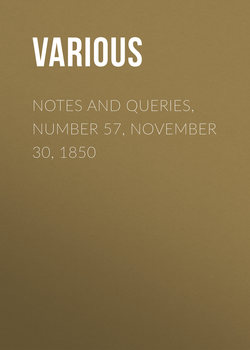Читать книгу Notes and Queries, Number 57, November 30, 1850 - Various - Страница 2
NOTES
ON THE POINTING OF A PASSAGE IN "ALL'S WELL THAT ENDS WELL."
ОглавлениеLafeu. "They say miracles are past: and we have our philosophical persons, to make modern and familiar, things, supernatural and causeless."—Act ii. Scene 3.
So the passage is pointed in Johnson and Steevens, that is, with a comma after the word "things;" and the same pointing is used in the recent editions of Mr. Knight, Barry Cornwall, and Mr. Collier.
It occurred to me that this pointing gave a meaning quite out of harmony with what directly follows, and also with the spirit in which Lafeu speaks. Let the comma be placed after "familiar", and the whole passage be read thus:
Lafeu. "They say miracles are past; and we have our philosophical persons to make modern and familiar, things supernatural and causeless. Hence is it, that we make trifles of terrors; ensconcing ourselves into seeming knowledge, when we should submit ourselves to an unknown fear."
Lafeu apparently is speaking somewhat sarcastically of those who say miracles are past, and who endeavour to explain away the wonderful into something common and well-known. Subsequently I found that Mr. Coleridge, in his Literary Remains (vol. ii. p. 121.), had adduced the above-mentioned passage, placing the comma after "familiar." He does not, however, make any observation on the other pointing; but remarking, that Shakspeare often uses "modern" for "common," proceeds thus:
"Shakspeare, inspired, as it might seem, with all knowledge, here uses the word causeless in its strict philosophical sense; cause being truly predicable only of phenomena,—that is, things natural, and not of noumena, or things supernatural."
It is, perhaps, rather curious, that although Mr. Collier, in his note on Lafeu's speech, has quoted the above from Mr. Coleridge, the improved pointing should have escaped that gentleman's notice.
Looking into Theobald's Shakspeare, I find that he also had placed the comma as Mr. Coleridge has. Mr. Theobald adds this note:
"This, as it has hitherto been printed, is directly opposite to our poet's and his speaker's meaning. As I have stopped it, the sense quadrates with the context: and surely it is one unalterable property of philosophy to make seeming strange and preternatural phenomena familiar and reducible to cause and reason."
Does not Mr. Theobald, in his closing remark, turn what in Lafeu is really an ironical outburst on would-be philosophers, into something like a serious common-place?
A. ROFFE.
Query, In a work entitled Philosophy of Shakspeare, by W.H. Roukin, Lafeu's speech is quoted, and one word changed; "and we have our philosophical persons," &c., becomes "yet we have," &c. Is there any authority for such a change?
A.R.
